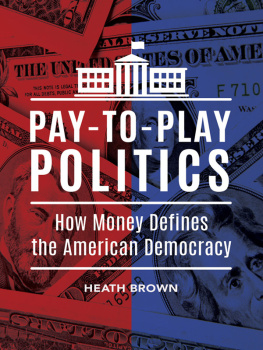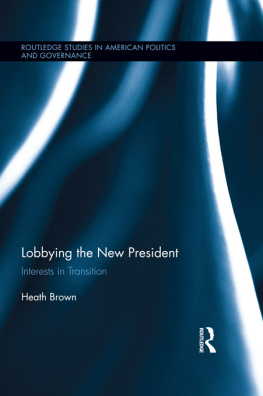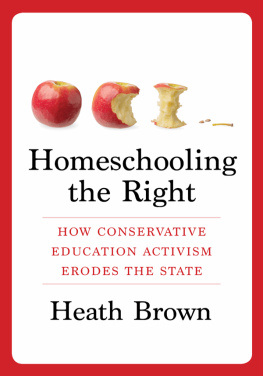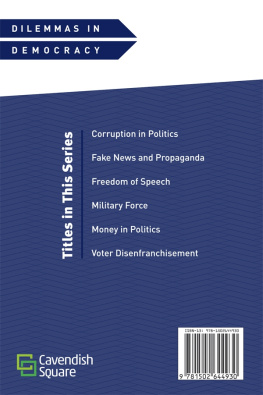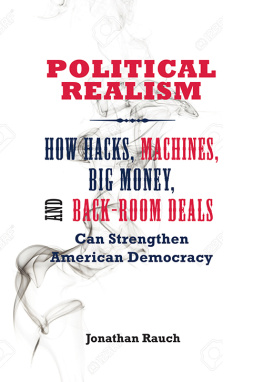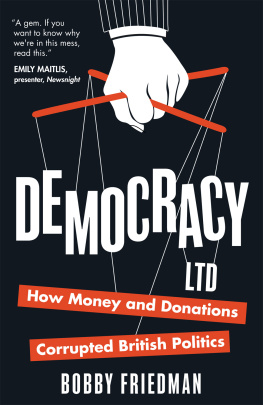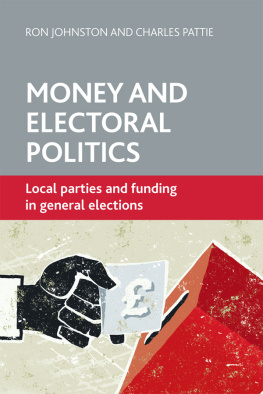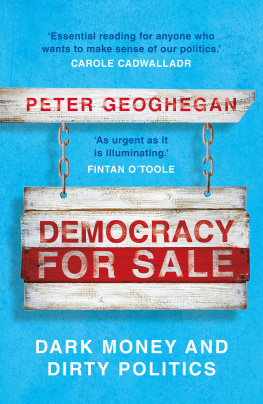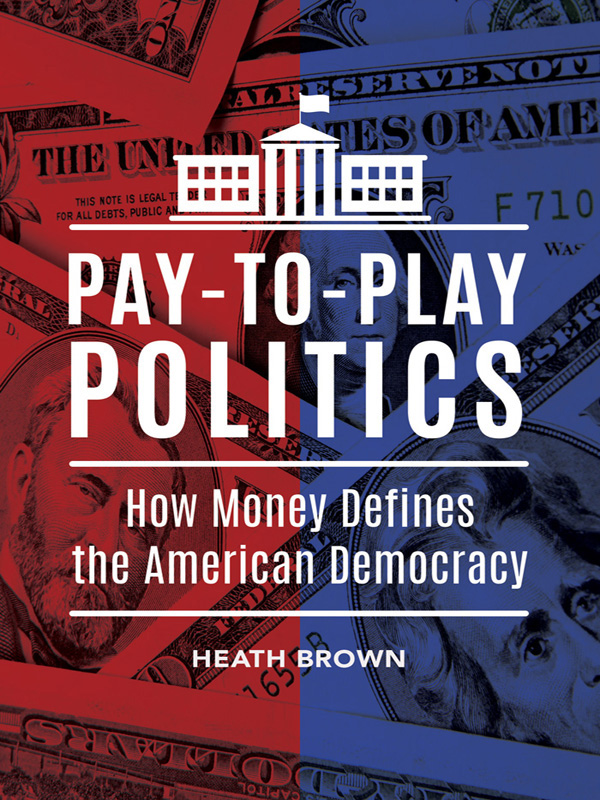Pay-to-Play Politics
Copyright 2016 by Heath Brown
All rights reserved. No part of this publication may be reproduced, stored in a retrieval system, or transmitted, in any form or by any means, electronic, mechanical, photocopying, recording, or otherwise, except for the inclusion of brief quotations in a review, without prior permission in writing from the publisher.
Library of Congress Cataloging-in-Publication Data
Pay-to-Play Politics
Library of Congress Cataloging in Publication Control Number: 2015047219
ISBN: 978-1-4408-5005-9
EISBN: 978-1-4408-5006-6
201918171612345
This book is also available on the World Wide Web as an eBook.
Visit www.abc-clio.com for details.
Praeger
An Imprint of ABC-CLIO, LLC
ABC-CLIO, LLC
130 Cremona Drive, P.O. Box 1911
Santa Barbara, California 93116-1911
This book is printed on acid-free paper 
Manufactured in the United States of America
Contents
FIGURES
TABLES
I wrote this book during my first year at John Jay College of Criminal Justice, City University of New York. The support of my new colleagues and resources provided by the college, especially John Jay Research, and the university made the book possible. Much of this book is a synthesis of the excellent work on the topic. Thank you to Christopher Witko, Lee Drutman, Thomas Holyoke, Tim LaPira, Frank Baumgartner, Avi Green, Michael Miller, Zephyr Teachout, Ray La Raja, Brian Murphy, Darrell West, and Michael Malbin for shaping my views of these issues with your excellent scholarship. The project would not have been possible without research and data from the Campaign Finance Institute and the Center for Responsible Politics. Jessica Gribble at Praeger encouraged me to write this book and helped make sure it was of the highest quality.
My family provides me with so much support and editorial assistance. My parents, Muriel Watt and Rick Brown, are my first line of defense against boring prose. I also wrote this book during my first year of marriage to my amazing wife and editor, Kate Storey. She adds the pop to my life and to my writing.
There are two great ironies that define the relationship between money and politics in the United States. One irony relates to the politicians that represent citizens and another irony is for the public-at-large.
The first irony is best illustrated during our most recent campaign. As she announced her candidacy for the presidency in Iowa in 2015, Hillary Clinton said, We need to fix our dysfunctional political system and get unaccountable money out of it once and for alleven if it takes a constitutional amendment.
Clinton was not alone on the issue; her two main challengers at the time, Martin OMalley and Bernie Sanders, went even further. Senator Sanders declared that the American democracy had come to resemble an oligarchy, and To restore our one person, one vote democracy, Congress must pass a constitutional amendment to overturn Citizens United and move toward public funding of elections. One minor Democratic candidate, Lawrence Lessig, even mounted a campaign based solely on this one issue. From all sides of the party, most agreed about the nature of the problem and even on a set of solutions.
Not to be outdone by their partisan opponents, Republicans entered the money-and-politics fray, though with fewer policy prescriptions. On anonymous political donations, Governor Chris Christiethen testing the presidential waterssaid, I think what is corrupting in this potentially is we dont know where the money is coming from.
The great irony, of course, was that as each candidate decried the corrupting influence of money on politics, they were each holding major fundraisers to support their own campaigns. Clinton left Iowa for a $2,700-per-person conversation at the San Francisco home of Tom Steyer. In the previous election, Steyer alone gave more than $73 million to support pro-environment candidates. And shortly after OMalley said, I would hope that in the Democratic Party that all of our candidates might discourage super PACs from being involved, a group of his supporters formed Generation Forward, a political action committee (PAC) (or super PAC), in order to raise money to support his campaign.
Irony was not lost on the Republican candidates who gathered funds from a constellation of super PACs and at a remarkable rate. Within just a single week of their formation, for example, super PACs supporting Cruz had raised $31 million, and Jeb Bushs super PAC quickly topped $100 million.
A second irony of the rare campaign bipartisanship on the issue of money and politics is the view of the American public-at-large. As the country has grown more polarized, divided, and disagreeable at the start of the 21st century, there was nearly a consensus on money and politics.
Thus, the second great irony: as several presidential campaigns spent multiple billions of dollars to secure the votes to win the White House, nearly all voters deplored that glaring aspect of the process. Hundreds of congressional campaigns followed a similar money-hungry approach, while at the same time routinely passing on the opportunity to change campaign finance laws that would likely decrease the amount of money in politics and greatly please voters. Can a democracy sustain such contradictions? As importantly, should it? In 2016, on the 40th anniversary of the landmark Supreme Court campaign finance decision, Buckley v. Valeo (1976), Pay-to-Play Politics aims to answer these questions.
WHATS TO WORRY ABOUT?
Because money and politics can mean many different things, what one worries about also will differ greatly. The classic concern about money and politics, the concern that motivates federal and state laws, relates to public corruption or acts that advance narrow private interests rather than broad public interests. The federal government codifies corruption in statute as when someone outside of government:
directly or indirectly, corruptly gives, offers or promises anything of value... to influence any official act; or... to influence such public official or person who has been selected to be a public official to commit or aid in committing, or collude in, or allow, any fraud, or make opportunity for the commission of any fraud, on the United States; or... to induce such public official or such person who has been selected to be a public official to do or omit to do any act in violation of the lawful duty of such official or person.
It is also against the law when someone in government demands payments for official acts. To be sure, what is and is not in the public interest is hotly contested, and the country has a long history of associating the private monetary gains of corporations with the well-being of the nation: the CEO of General Motors, Charles Wilson, famously said during his
Notwithstanding the difficulty of precisely defining what is or is not in the public interest, corruption remains illegal. For example, because elected officials make decisions about how the government will spend its money, a primary concern is that these officials will use this power for personal benefit, what is called graft. Rather than choosing the most competitive bid from a private contractor to build a new bridge or public school, graft could lead to awarding contracts to second-rate companies, faulty construction, and government waste. So, when the mayor of New Orleans, Ray Nagin, accepted a half a million dollars in bribes for granting favors during the reconstruction of the city following Hurricane Katrina, he ended up in jail.

